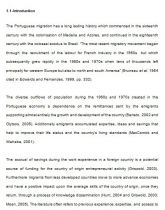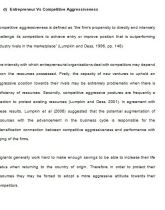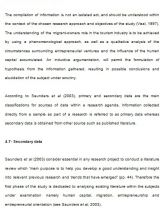Hľadaj
Zobraz:
Univerzity
Kategórie
Rozšírené vyhľadávanie
45 090 projektov
0 nových
Measure the influence of human capital accumulated abroad
| Prípona .doc |
Typ bakalárska práca |
Stiahnuté 0 x |
| Veľkosť 0,3 MB |
Jazyk anglický |
ID projektu 9827 |
| Posledná úprava 05.10.2018 |
Zobrazené 560 x |
Autor: - |
 Zdieľaj na Facebooku
Zdieľaj na Facebooku |
||
| Detaily projektu | ||
- cena:
30 Kreditov - kvalita:
84,6% -
Stiahni
- Pridaj na porovnanie
- Univerzita:Ekonomická univerzita v Bratislave
- Fakulta:Obchodná fakulta
- Kategória:Ekonomika » Svetová ekonomika
- Predmet:-
- Študijný program:-
- Ročník:-
- Formát:MS Office Word (.doc)
- Rozsah A4:73 strán
This primary aim of this study is to measure the influence of human capital accumulated abroad upon the various dimensions of entrepreneurial orientation amongst the returning population in Portugal. Special attention was given to creation and development of micro and small business in the hospitality industry.
1.4- Objectives
• Identify and critically assess the variables influencing the entrepreneurial behaviour of the inflow migration.
• Scrutinize the influence of experience, skills and education obtained in other countries upon the entrepreneurial strategic orientation of the hospitality business.
• Assess the mechanisms that the entrepreneurs have established within the firms to comply with the established entrepreneurial orientation dimensions.
• Obtain conclusions and provide suggestions about the current situation of the business of the group object of this study and the need for further research.
1.4- Objectives
• Identify and critically assess the variables influencing the entrepreneurial behaviour of the inflow migration.
• Scrutinize the influence of experience, skills and education obtained in other countries upon the entrepreneurial strategic orientation of the hospitality business.
• Assess the mechanisms that the entrepreneurs have established within the firms to comply with the established entrepreneurial orientation dimensions.
• Obtain conclusions and provide suggestions about the current situation of the business of the group object of this study and the need for further research.
Kľúčové slová:
industry analysis
resource
general human capital
enterpreneur
phenomenology
Obsah:
- Chapter 1: INTRODUCTION
1.1- Introduction
1.2- Rationale
1.3- Aim of the Study
1.4- Objectives
1.5- Structure of the Dissertation
Chapter 2: INDUSTRY ANALYSIS
2.1- Entrepreneurship within the hospitality Industry
2.2- Characterisation of the Portuguese tourism industry
Chapter 3: LITERATURE REVIEW
3.1- Introduction
3.2- Resource-based Theory
3.3- Human Capital Theory
3.3.1- Specific Human Capital
3.3.2- General Human Capital
3.3.3- Dimension of the Human capital
Proxy 1) Manager- Owner’s previous experience
Proxy 2) Business owner’s skills obtained through formal education
3.4- Entrepreneurship Research
3.4.1-Background
3.4.2- Economic theory
3.4.3-Traits theory
3.4.4-Entrepreneurial Orientation Perspective
a) Entrepreneur Vs Innovation
b) Entrepreneur Vs Risk-taking
c) Entrepreneur Vs Proactivity
d) Entrepreneur Vs Competitive Aggressiveness
e) Entrepreneur Vs Autonomy
3.5- Chapter Summary
3.6- Main conclusions of the literature review
Chapter 4: RESEARCH METHODOLOGY
4.1- Introduction
4.2- Research Philosophy: Positivism Versus Phenomenological
4.2.1-Positivist Philosophy
4.2.2- Phenomenological Philosophy
4.2.3-Research Approach: Inductive Versus Deductive
4.4- Research strategy
4.5- Time framework
4.6- Data Collection method
4.7- Secondary data
4.8- Primary data
4.9- Research Sample
4.10- Interview process
4.11- Limitations and Constrains
4.12- Conclusion
Chapter 5: PRIMARY RESEARCH FINDINGS
Chapter 6: DISCUSSION OF FINDINGS
Chapter 7: CONCLUSIONS AND RECOMMENDATIONS
Chapter 8: BIBLIOGRAPHY
Zdroje:
- Altinay, L. and Altinay, M. (2004). ‘The influence of organisational structure on entrepreneurial orientation and expansion performance’ in International Journal of Contemporary Hospitality Management, Vol. 16, No. 6, pp.334 - 344
- Voss, Z. et al (Jul 2004). An Empirical Examination of the Complex Relationship Between Entrepreneurial Orientation and Stakeholder Support. Case Working Paper Series No. 6. Center for the Advancement of Entrepreneurship: Duke The Fuqua School of Business, North Carolina
- Ucbasaran, D., Wright, M. and Westhead, P. (2003). ‘A longitudinal study of habitual entrepreneurs; starters and acquirers’ in Entrepreneurship & Regional Development, Vol. 15, pp. 207 - 228
- Zahra, S. (2005). ‘Entrepreneurial risk taking in family firms’ in Family Business Review, Vol. XVIII, No. 1, pp. 23 - 40
- Hisrich, R. and Drnovsek, M. (2002). ‘Entrepreneurship and small business research - a European perspective’ in Journal of Small Business and Enterprise Development, Vol. 9, No. 2, pp. 172 - 222
- Alvarez, S. and Busenitz, L. (2001). ‘The entrepreneurship of resource-based theory’ in Journal of Management, Vol. 27, pp. 755 - 775
- Examines the influence of the cognitive ability of entrepreneurs as an important resource in their route to self-employment. Individuals possess specific resources that increase their ability to recognise new opportunities and accrue assets for the new business enterprise. “Entrepreneurship opportunities exist primarily because different agents have different beliefs about the relative value of resources when they are converted from inputs to outputs” (heterogeneity: link between entrepreneurship and resource-based theory).
- Bridge, S., O’Neill, K. and Cromie, S. (2003). Understanding Entreprise, Entrepreneurship and Small Business. (2nd ed). University College Dublin: Plagrave Macmillan
- Bhattacharya, M. and Wright, P. (2004). Options For Human Capital Acquisition. Cornell University. School of Industrial and Labor Relations Center for Advanced Human Resource Studies. Working Paper 04-07
- Mills, J. et al (2003). ‘Applying resource-based theory. Methods, outcomes and utility for managers’ in International Journal of Operations and Production Management. Vol. 23, No. 2, pp. 148-166
- Conner, K. (1991). ‘An historical comparison of resource-based theory and five schools of thought within industrial organization economics: Do we have a new theory of the firm? In Journal of Management, Vol. 17, pp. 121 - 154
- Penrose, E. (1995). The Growth Of The Firm. (3rd ed). New Preface. Oxford University Press
- Drucker, P. (1984). Our Entrepreneurial Economy. Harvard Business Review. Jan - Feb
- Lepak, D. and Sneil, S. (1999). ‘The human resource architecture: Towards a theory of human capital allocation and development’ in Academy of Management ReviewI, Vol. 24. pp. 31 - 48
- Shane, S. and Venkataraman, S. (2000). ‘The promise of entrepreneurship as a field of research’ in Academy of Management Review, Vol. 25, No. 1, pp. 217 - 226
- McCornick, B. and Wahba, J. (Apr 2000). ‘Overseas employment and remittances to a dual economy’ in The Economic Journal, pp. 509 - 534







